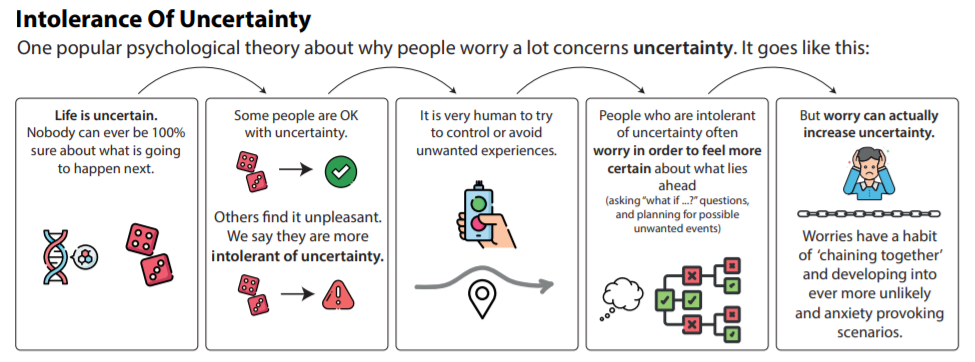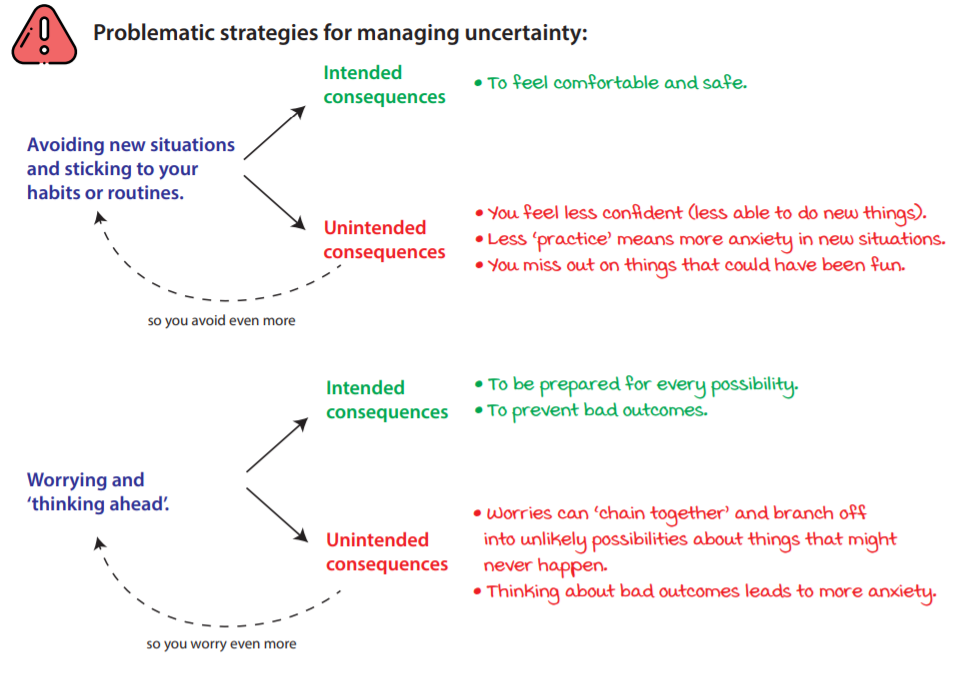Coping with Uncertainty During Covid-19

Coping with uncertainty is a common part of life but not necessarily an easy one. None of us can be 100% sure about anything that’s going to happen in our lives. Some people deal with uncertainty with excitement and manage well because of their mindset and their “openness to experience”. While others struggle with what they have no control over things, find uncertainty stressful, distressful and have difficulty functioning when they don’t know what’s going to happen next. These individuals may also hold more negative and unhelpful beliefs about uncertainty and the unknown, they may avoid it, or even attempt to use strategies to control it if possible to eliminate it.
We label this as “intolerance of uncertainty” as a result of these reactions. Typically, individuals who have difficulty with uncertainty may act as though they are afraid of uncertainty, or as if they are allergic or have a reaction to uncertainty.

When this intolerance to uncertainty was first realized in people it was noticed in those struggling with Generalized Anxiety Disorder or GAD. Reactions to GAD may be worry, rumination, avoidance and frequently be seen as an individuals attempts to increase their certainty with a focus on trying to predict the future to help calm their worries. By trying to predict possible negative future outcomes, avoidance and sticking to what is known and safe this may in their mind help to reduce their exposure to the unknown. Research now suggests that intolerance of uncertainty may be a transdiagnostic risk factor for various clinical conditions such as but not limited to anxiety, OCD, depression, and eating disorders (Carleton et al, 2012; Toffolo et al, 2014; Renjan et al, 2016).
The Intolerance Of Uncertainty information handout describes intolerable uncertainty in the context of worry, and outlines some of the unhelpful strategies that people high in IU tend to use to control how they feel. One important aspect of treatment for GAD is the effort to increase client’s willingness to tolerate uncertainty, sometimes framed as the challenge of ‘embracing uncertainty’.

Helpful Ways To Manage Uncertainty
- Accept that uncertainty is a part of life. You will no longer need to fight or resist something if you learn to cope with it and become curious about how your feeling, and accepting it.
- Embracing and leaning into the uncertainty. This can be easier said than done. However, this being said we have to remember that we often make things harder than they need to be. If we can face our fears and embrace this uncertainty we can be better able to cope with it. After a while you may enjoy it and look forward to the surprise life often brings.
- Change your mindset when it comes to uncertainty. Think about what it would be like if there was no uncertainty? How would it feel if you always knew what was going to happen before it happened? There would be no surprise in life. How would you feel to watch a movie or read a book but you already know the ending? Life might be a little boring if everything was too predictable.
We Can Help, Don’t Struggle Any Longer
We can help you cope with uncertainty and improve your quality of life. Don’t wait or struggle a moment longer. Email us today at admin@ovcs.ca.
References
- Carleton, R. N., Mulvogue, M. K., Thibodeau, M. A., McCabe, R. E., Antony, M. M., Asmundson, G. J. (2012). Increasingly certain about uncertainty: intolerance of uncertainty across anxiety and depression. Journal of Anxiety Disorders, 26(3), 468–79.
- Dugas, M. J., Buhr, K., & Ladouceur, R. (2004). The role of intolerance of uncertainty in the etiology and maintenance of generalized anxiety disorder. In R. G. Heimberg, C. L. Turk, & D. S. Mennin (Eds.), Generalized anxiety disorder: advances in research and practice (pp. 143–163). New York: Guilford Press.
- Dugas, M. J., & Robichaud, M. (2007). Cognitive-behavioural treatment for generalized anxiety disorder: from science to practice. New York: Routledge.
- Renjan, V., McEvoy, P. M., Handley, A. K., Fursland, A. (2016). Stomaching uncertainty: relationships among intolerance of uncertainty, eating disorder pathology, and comorbid emotional symptoms. Anxiety Disorders, 41, 88–95.
- Toffolo, M. B., van den Hout, M. A., Engelhard, I. M., Hooge, I. T., Cath, D. C. (2014). Uncertainty, checking, and intolerance of uncertainty in subclinical obsessive compulsive disorder: an extended replication. Journal of Obsessive Compulsive and Related Disorders, 3(4), 338–44.
- Wilkinson, A., Meares, K., Freeston, M. 2011. CBT for worry & generalised anxiety disorder. London: Sage.
Don’t forget to Like, Share and Follow Us on our social media links too.

Our Links on Social Media:
- Facebook – https://www.facebook.com/orchardvalleycounselling.ca/
- Instagram – https://www.instagram.com/orchard_valley_okanagan/?hl=en
- LinkedIn – http://LinkedIn https://www.linkedin.com/company/orchard-valley-counselling-services/?viewAsMember=true
- Twitter – https://twitter.com/ovcs2017


